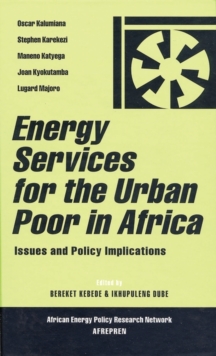
The Regulation of the Power Sector in Africa : Attracting Investment and Protecting the Poor Hardback
Edited by Edward Marandu, Dorcas Kayo
Part of the African Energy Policy Research series
Hardback
Description
Attracting private investment and delivery of services to the poor majority are two of the major goals for reforming and regulating the power sector in sub-Saharan Africa.
This book believes the important determinants of new investment in the electricity industry are the licensing process and the tariff regime. If the licensing process is to attract private investors, the procedures must be clear and must function efficiently and transparently, and the tariff regime reflect actual costs.
The rationale for attracting private investment is straightforward -- the inadequacy of existing power systems in the region to meet demand.
In many countries, frequent power cuts linked to inadequate electricity generation capacity are the norm rather than the exception. The rationale for considering the plight of the poor is based on both ethical and sustainability considerations.
In ethical terms, access to energy is a fundamental human right in the context of social justice.
In sustainability terms, a reformed private-investor-dominated power sector that does not recognize the plight of the poor may represent sound economics yet prove to be socially and politically unsustainable.
It is therefore necessary to ensure that the recommended regulatory reforms are sensitive to the needs of the poor majority. This volume examines the extent to which the twin goals of attracting investment and providing energy to the poor are addressed by the existing legal and regulatory framework.
By studying six countries in the east and southern African region, some helpful lessons worth sharing with other African countries are learned.
Information
-
Out of stock
- Format:Hardback
- Pages:384 pages
- Publisher:Bloomsbury Publishing PLC
- Publication Date:30/11/2004
- Category:
- ISBN:9781842775608
Information
-
Out of stock
- Format:Hardback
- Pages:384 pages
- Publisher:Bloomsbury Publishing PLC
- Publication Date:30/11/2004
- Category:
- ISBN:9781842775608









